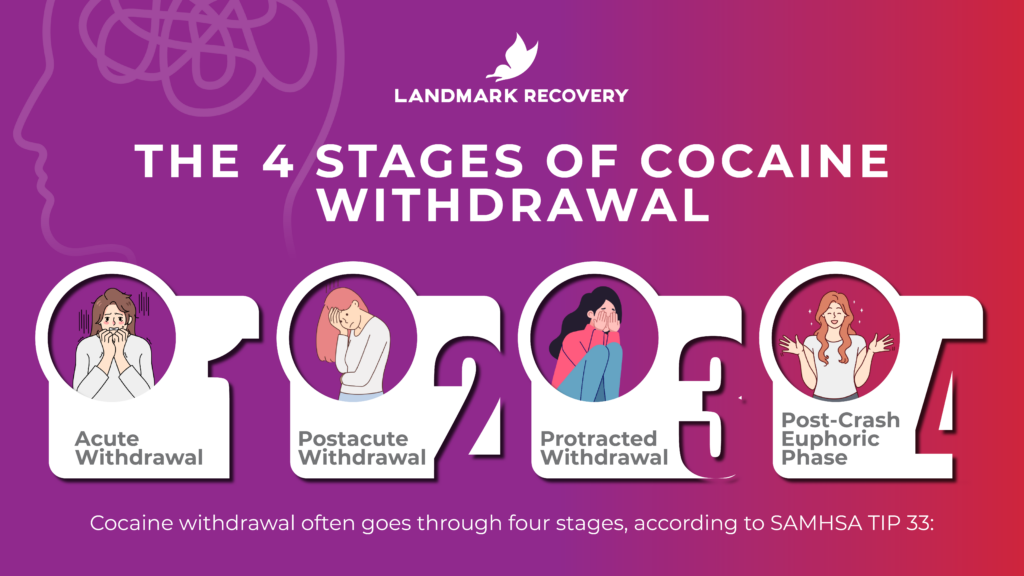Updated: August 25, 2023, at 3:10 p.m.
Cocaine withdrawal symptoms usually fade after a few days of not using. However, some symptoms can linger for up to three to four weeks, according to SAMHSA’s Treatment Improvement Protocol (TIP) No. 45. Because every person’s withdrawal experience is different, especially when they detox from cocaine, it’s important to remember that recovery doesn’t always follow the same timeline.
Key points in this blog:
- Cocaine withdrawal lasts several days but can last up to 3-4 weeks.
- The withdrawal process can be divided into three stages: crash, withdrawal, and extinction.
- Factors like cocaine amount, duration, method of use, and co-occurring disorders can influence the intensity of withdrawal symptoms.
- Medical detox, a drug addiction treatment program offered at Landmark Recovery, provides a safer and more effective path to quitting cocaine.
Cocaine Withdrawal: What to Expect
During cocaine withdrawal, you may experience various symptoms as your body adjusts to a drug-free life. Physically, you may feel discomfort, fatigue, increased appetite, and experience restless sleep. Emotionally, you might face depression, anxiety, and strong cravings for the drug. It’s important to know that these symptoms are normal and indicate that your body is healing and adapting.
TIP 45 says that cocaine can suppress appetite and inhibit nutrient absorption. It may also increase the risk of:
- Becoming violent
- Seizures
- Irregular heartbeat
However, cocaine withdrawal usually doesn’t cause severe physical symptoms.
Phases of Cocaine Withdrawal: From Crash to Recovery
Cocaine withdrawal often goes through four stages, according to SAMHSA TIP 33:
- Acute Withdrawal
- Post-Acute Withdrawal (also known as PAWS)
- Protracted Withdrawal
- Post-Crash Euphoric Phase
Here’s a more straightforward way to understand these stages.
Acute Withdrawal or the “Crash”
This is the first stage of withdrawal that can start within a few hours after the last use of cocaine. You might feel:
- Tired
- Hunger
- Restless
- Strong cocaine cravings
If so, experts recommend trying the HALT Method. This stage can be very intense and usually lasts several days up to a week. In the initial couple of weeks, some people might also have suicidal thoughts. Close monitoring is needed if you use cocaine for a long time or in large amounts and decide to quit.
Post-Acute Cocaine Withdrawal or “The Wall”
Following the “crash,” physical symptoms might decrease, but emotional or mental symptoms can continue and last anywhere from one to 10 weeks. During this time, cravings may lessen but could suddenly come back intensely. This is a time of lots of ups and downs in mood, and you might have trouble sleeping.
Protracted Withdrawal: The Long-Term Journey
After the intense early withdrawal, you might feel symptoms opposite the cocaine high. This could include feeling:
- Tired
- Low energy
- Depression
- No joy in things you used to
- No interest in what’s happening around you
These long-term withdrawal symptoms can be severe and might last long, especially if you used cocaine for a while or in large amounts. During this time, cocaine cravings might return or get stronger.
Post-Crash Euphoric Phase
This is a period where people can feel very positive and self-confident. It’s often called “the pink cloud” and happens around 30 days after withdrawal. But this period often doesn’t last long and is followed by depression, usually around three to six months after quitting, when there’s a high chance of relapsing.
These stages might not happen exactly as described. However, this guide gives a general idea of what to expect. The key takeaway is that while cocaine withdrawal can be difficult, recovery is possible, and professional help can make this journey safer and more manageable.
Understanding cocaine’s withdrawal stages can be the first step towards a healthier future. Our infographic breaks down the complex process into easy-to-understand visuals and clear information. Don’t struggle alone with confusion and fear – download our infographic today and empower yourself with the knowledge to support yourself or a loved one on the path to recovery.
What Factors Influence Cocaine Withdrawal Length?
Several factors can make your cocaine withdrawal longer or harder. These include:
- How Much You Used: If you’ve abused cocaine regularly, your body likely got used to it. So when you quit, you may feel stronger withdrawal symptoms and take longer to feel better and recover.
- How Long You’ve Been Using: If you’ve been using cocaine for a long time, your body is even more used to the drug. Your withdrawal might last longer than someone who hasn’t used it for as long.
- How You Took It: Snorting, smoking, or injecting cocaine affects your body differently. For example, if you smoke cocaine, your body absorbs it fast, and you might start feeling withdrawal symptoms sooner than if you snort it.
Coping with Cocaine Withdrawal Complications
Sometimes, quitting cocaine can come with extra challenges. Here’s what to know:
- Co-occurring Substance Abuse: If someone’s been using cocaine and other drugs or alcohol, quitting can be more complicated. For example, if a person has been drinking alcohol to cope with cocaine withdrawal, it might worsen their symptoms. That’s why it’s important to let doctors know about any other substances used so that they can adjust your treatment plan.
- Mental Health Disorders: Also known as a dual diagnosis. If someone already struggles with mental health problems like anxiety or depression, cocaine withdrawal can strengthen these feelings. For example, if a person tends to feel anxious, they might feel extra nervous without cocaine. That’s why a treatment plan should cover both the cocaine problem and any mental health conditions.
- Relapse: When someone goes through withdrawal, they might start craving cocaine a lot. It’s like feeling very hungry, but for cocaine. This can lead them back to using cocaine again, even if they want to quit. This is called a relapse. Staying in a supportive and drug-free environment can help to resist these cravings and avoid a relapse.
Listen to a 2020 Landmark Recovery Podcast episode on co-occurring disorders:
How to Quit Cocaine
Quitting cocaine can feel like an uphill battle, but professional support makes the journey easier. Here’s a look at some cocaine treatment options to help make the process more manageable:
- Medical Detox: Imagine this as having a personal medical team by your side 24/7 while you withdraw from cocaine. They watch you, ensuring you stay safe and comfortable during this challenging phase.
- Inpatient Rehab: Think of this treatment program as moving into a supportive, healing community surrounded by people who understand your struggles. Here, you live, eat, and breathe recovery, engaging in intensive therapies and skill-building classes to help you overcome cocaine addiction.
- Outpatient Rehab: Picture this as a balance between tackling addiction and managing day-to-day life. You’ll attend therapy sessions at a rehab center and maintain your home and work life. It’s like having a support group that’s there when you need it but steps back when you need to handle life’s daily demands.
- Telehealth: Envision access to recovery help anytime, anywhere. With this method, your treatment comes to you, offering convenience and flexibility. Whether it’s a late-night craving or a tough day at work, your recovery team is just a phone call or video conference away.
Why Medical Detox Matters
Going cold turkey might be tempting and brave, but medical detox offers a safer and more effective path. That’s because when dealing with cocaine withdrawal, there’s no proven medicine to make things easier, according to SAMHSA’s TIP 45. This means doctors must closely monitor and manage any health problems caused by cocaine use and withdrawal.
For example, cocaine makes people lose their appetite. It can mess with how our bodies take in calcium and vitamin D. It also tightens the blood vessels (vasoconstriction), leading to several health problems:
- Heart attacks
- Strokes
- Kidney diseases
- Tissue death in the bowel
Think about the detox process like a road trip. If you set off without any preparation or support, you may face bumps or detours you weren’t expecting. But having a guide or a map can make the journey smoother and safer. That’s what the cocaine detox program at Landmark Recovery does – it provides 24/7 medical care to manage withdrawal symptoms, helping you get from dependence on drugs to a stable, sober life in the safest possible way.
For example, it’s common for people withdrawing from cocaine to have trouble sleeping. Our medical team can help with this, providing medications like diphenhydramine (Benadryl) or trazodone (Desyrel) to help improve sleep.
Cocaine Treatment Programs at Landmark Recovery
Quitting cocaine is tough, but it’s a battle you don’t have to fight alone. Landmark Recovery offers several programs to help you or your loved one recover from cocaine addiction.
- Medical Detox: You’re medically supervised while your body clears out cocaine. This means doctors and nurses are always there to help stabilize withdrawal symptoms. Think of it like having a safety net during the hardest part of your recovery journey.
- Inpatient Rehab: This is a more personal, one-on-one program. We work closely with you to find the best ways to help you fight your addiction. This might mean talking therapies, group sessions, or learning new skills and habits.
- Residential Treatment: Imagine a safe place to focus only on improving without distractions or triggers. That’s what our residential treatment is. You stay at our facility and receive support and help 24/7.
- Outpatient Rehab: Maybe you have work, school, or family responsibilities you can’t leave behind. Our outpatient rehab program lets you get treatment while caring for your duties. It’s like attending a regular doctor’s appointment but for your addiction.
- Aftercare Programs: Staying sober is a lifelong journey. That’s why we keep supporting you through an alumni network and Recovery Coaching Program even after you’ve left our programs. With aftercare, you can continue to get the support you need to stay sober.
If you’re struggling with cocaine addiction and need help, Landmark Recovery is here for you. We believe in a future where every person impacted by addiction has the opportunity to transform their life. Together, we can make it a reality.
Confidentiality You Can Trust
Our admissions phone line, available 24/7/365, ensures you always have a safe and private place to reach out to. Don’t let addiction control your life any longer; take the first step towards recovery, and call 888-448-0302 to speak to a Patient Navigator anytime.
Find a Cocaine Rehab Center Near You
We have multiple locations nationwide to ensure convenient access to our services. Visit our locations page to find a drug detox center, drug rehab center, or inpatient or outpatient drug rehab center near you.
Learn More About Cocaine Addiction and Treatment
Interested in learning more about cocaine addiction and the recovery process? Read these helpful articles:
- What Is The Cocaine High and How Does It Feel?
- The Dangers of Cocaine Withdrawal
- Rising Deaths from Mixing Cocaine with Opioids
- The Effects of Cocaine
- How Long Does Cocaine Stay in Your System?
- The Effects of a Cocaine Overdose
- E-Cigarettes Increase Risk of Cocaine Use, Study Says
- How Cocaine Affects Your Body

Choose Recovery Over Addiction
We're here 24/7 to help you get the care you need to live life on your terms, without drugs or alcohol. Talk to our recovery specialists today and learn about our integrated treatment programs.





